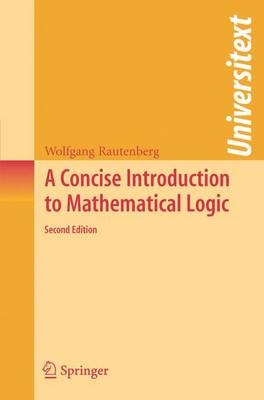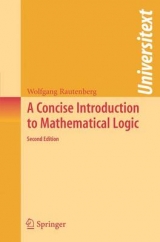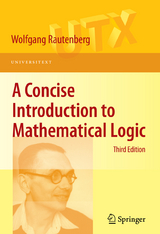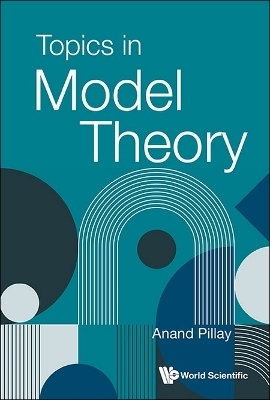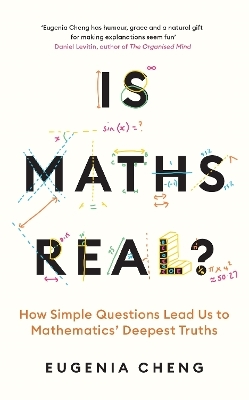A Concise Introduction to Mathematical Logic
Seiten
2006
|
2nd Revised edition
Springer-Verlag New York Inc.
978-0-387-30294-2 (ISBN)
Springer-Verlag New York Inc.
978-0-387-30294-2 (ISBN)
- Titel ist leider vergriffen;
keine Neuauflage - Artikel merken
Zu diesem Artikel existiert eine Nachauflage
Focusing on mathematical logic, this title contains material on logic programming for computer scientists, model theory, recursion theory, Godel's Incompleteness Theorems, and applications of mathematical logic. Philosophical and foundational problems of mathematics are discussed and exercises are included for each chapter.
Traditional logic as a part of philosophy is one of the oldest scientific disciplines. Mathematical logic, however, is a relatively young discipline and arose from the endeavors of Peano, Frege, Russell and others to create a logistic foundation for mathematics. It steadily developed during the 20th century into a broad discipline with several sub-areas and numerous applications in mathematics, informatics, linguistics and philosophy. While there are already several well-known textbooks on mathematical logic, this book is unique in that it is much more concise than most others, and the material is treated in a streamlined fashion which allows the professor to cover many important topics in a one semester course. Although the book is intended for use as a graduate text, the first three chapters could be understood by undergraduates interested in mathematical logic. These initial chapters cover just the material for an introductory course on mathematical logic combined with the necessary material from set theory. This material is of a descriptive nature, providing a view towards decision problems, automated theorem proving, non-standard models and other subjects.
The remaining chapters contain material on logic programming for computer scientists, model theory, recursion theory, Godel's Incompleteness Theorems, and applications of mathematical logic. Philosophical and foundational problems of mathematics are discussed throughout the text. The author has provided exercises for each chapter, as well as hints to selected exercises. About the German edition: The book can be useful to the student and lecturer who prepares a mathematical logic course at the university. 'What a pity that the book is not written in a universal scientific language which mankind has not yet created.' - A. Nabebin, Zentralblatt.
Traditional logic as a part of philosophy is one of the oldest scientific disciplines. Mathematical logic, however, is a relatively young discipline and arose from the endeavors of Peano, Frege, Russell and others to create a logistic foundation for mathematics. It steadily developed during the 20th century into a broad discipline with several sub-areas and numerous applications in mathematics, informatics, linguistics and philosophy. While there are already several well-known textbooks on mathematical logic, this book is unique in that it is much more concise than most others, and the material is treated in a streamlined fashion which allows the professor to cover many important topics in a one semester course. Although the book is intended for use as a graduate text, the first three chapters could be understood by undergraduates interested in mathematical logic. These initial chapters cover just the material for an introductory course on mathematical logic combined with the necessary material from set theory. This material is of a descriptive nature, providing a view towards decision problems, automated theorem proving, non-standard models and other subjects.
The remaining chapters contain material on logic programming for computer scientists, model theory, recursion theory, Godel's Incompleteness Theorems, and applications of mathematical logic. Philosophical and foundational problems of mathematics are discussed throughout the text. The author has provided exercises for each chapter, as well as hints to selected exercises. About the German edition: The book can be useful to the student and lecturer who prepares a mathematical logic course at the university. 'What a pity that the book is not written in a universal scientific language which mankind has not yet created.' - A. Nabebin, Zentralblatt.
Foreword.- Preface.- Introduction.- Notation.- Propositional Logic.- Predicate Logic.- Godel?s Completeness Theorem.- The Foundations of Logic Programming.- Elements of Model Theory.- Incompleteness and Undecidability.- On the Theory of Self-Reference.- Hints to the Exercises.- Literature.- Index of Terms and Names.- Index of Symbols.
| Erscheint lt. Verlag | 15.5.2006 |
|---|---|
| Reihe/Serie | Universitext |
| Zusatzinfo | 8 black & white illustrations, 4 black & white tables, 8 black & white line drawings |
| Verlagsort | New York, NY |
| Sprache | englisch |
| Maße | 155 x 235 mm |
| Gewicht | 427 g |
| Einbandart | Paperback |
| Themenwelt | Mathematik / Informatik ► Mathematik ► Logik / Mengenlehre |
| ISBN-10 | 0-387-30294-8 / 0387302948 |
| ISBN-13 | 978-0-387-30294-2 / 9780387302942 |
| Zustand | Neuware |
| Haben Sie eine Frage zum Produkt? |
Mehr entdecken
aus dem Bereich
aus dem Bereich
Buch | Softcover (2024)
World Scientific Publishing Co Pte Ltd (Verlag)
31,15 €
what we have that machines don't
Buch | Softcover (2024)
Profile Books Ltd (Verlag)
13,70 €
how simple questions lead us to mathematics’ deepest truths
Buch | Softcover (2024)
Profile Books Ltd (Verlag)
13,70 €
